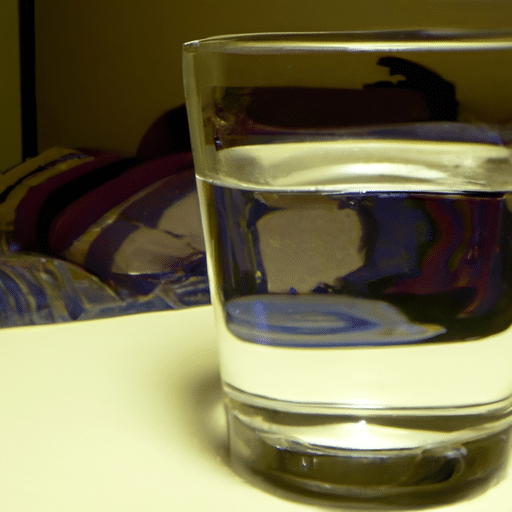Have you ever found yourself waking up in the middle of the night, feeling the sudden urge to use the bathroom? Don’t worry, you’re not alone. Many of us have experienced this phenomenon at some point in our lives. In this article, we will explore the reasons behind this common interruption to our sleep and whether or not it is considered normal. So, if you’ve ever wondered why your bladder seems to have a mind of its own at night, keep reading to find out more.
Review contents
Factors That Contribute to Waking up at Night to Use the Bathroom
Fluid Intake Before Bed
Many people experience the need to use the bathroom at night due to consuming excessive fluids before bedtime. While staying hydrated throughout the day is essential for overall health, it is recommended to reduce fluid intake, especially beverages with diuretic properties, closer to bedtime. This can help minimize the urge to urinate during the night and promote a more peaceful and uninterrupted sleep.
Age and Hormonal Changes
As we age, our bodies undergo various changes, including hormonal fluctuations. For both men and women, hormonal imbalances can contribute to nocturnal awakenings to use the bathroom. For example, women may experience an increase in nocturnal bathroom visits due to hormonal changes during menopause. Similarly, older men may experience increased prostate gland enlargement, known as benign prostatic hyperplasia (BPH), which can lead to frequent nighttime urination.
Medical Conditions
Certain medical conditions can also trigger the need to use the bathroom at night. Conditions such as urinary tract infections, bladder infections, and interstitial cystitis can cause frequent urination, including nocturnal awakenings. Additionally, individuals with diabetes may experience nocturia due to the body’s decreased ability to appropriately regulate fluid balance.
Medications and Diuretics
Several medications and diuretics can contribute to nocturia, prompting individuals to wake up at night to use the bathroom. Medications such as diuretics, commonly prescribed for high blood pressure, can increase urine production and subsequently lead to frequent urination. It is important to discuss any medications or diuretics being taken with a healthcare professional to determine their potential impact on nocturia.
Understanding Nocturia
Definition of Nocturia
Nocturia refers to the condition characterized by the need to wake up at night to urinate. It is a common phenomenon experienced by many individuals, particularly as they age. Generally, nocturia is defined as urinating more than once during the night or experiencing the urge to urinate that disrupts sleep.
Causes of Nocturia
Nocturia can have multiple causes, including the factors mentioned above, such as fluid intake before bed, hormonal changes, medical conditions, and medications. Additionally, lifestyle choices, such as excessive consumption of caffeine or alcohol, can also contribute to nocturia. Understanding the underlying causes of nocturia is essential for effective management and treatment.
Impact on Sleep Quality
Frequent awakenings to use the bathroom can significantly disrupt the overall quality of sleep. The constant need to get up and urinate can prevent individuals from entering deep sleep cycles, leading to reduced sleep duration and daytime fatigue. Furthermore, the interruption of sleep can also impact cognitive function and overall daytime productivity. It is essential to address nocturia to improve sleep quality and overall well-being.
When Should You Be Concerned?
Frequency and Disruption
While nocturia is often considered a normal occurrence, it is essential to identify when it may indicate an underlying problem. If waking up to use the bathroom occurs more than twice per night and significantly disrupts sleep patterns, it may be a cause for concern. Frequent nocturnal bathroom visits can impact sleep quality and overall health, so seeking medical evaluation is recommended in such cases.
Associated Symptoms
In addition to frequent awakenings, there may be other associated symptoms that warrant medical attention. These symptoms can include pain or discomfort during urination, urgency, blood in urine, or changes in bladder control. Any of these additional symptoms should be assessed by a healthcare professional to rule out potential underlying medical conditions.
Tips to Manage Nocturnal Bathroom Visits
Limiting Fluid Intake at Night
One of the simplest strategies to manage nocturia is to reduce fluid intake close to bedtime. Consuming less fluid in the evening can help minimize the need to urinate during the night. It is important to strike a balance between staying adequately hydrated throughout the day and reducing fluid intake in the evening to promote a restful night’s sleep.
Establishing a Bedtime Routine
Establishing a regular bedtime routine can help signal the body that it is time to wind down and prepare for sleep. This routine can include activities such as relaxation techniques, reading a book, or taking a warm bath. Creating a calming environment and adhering to a consistent schedule can promote better sleep and potentially reduce the frequency of nocturnal bathroom visits.
Managing Underlying Conditions
If nocturia is a result of an underlying medical condition, managing and treating the underlying condition is crucial. This may involve medical interventions such as antibiotics for urinary tract infections or lifestyle modifications for conditions like diabetes or BPH. Working closely with healthcare professionals can help identify and address the underlying causes, leading to improved sleep and reduced nocturnal awakenings.
Medication Evaluation
If excessive urination during the night is potentially caused by medication, it is important to consult with a healthcare professional. They can evaluate the medications being taken and potentially adjust the dosage or prescribe alternative options that might have fewer nocturia-related side effects. It is important never to stop or adjust medications without medical guidance.
Seeking Medical Evaluation
Keeping a Sleep Diary
Keeping a sleep diary can be a useful tool in identifying patterns and tracking the frequency and disruption caused by nocturnal bathroom visits. This diary can document the time of going to bed, waking up, fluid intake, nocturnal awakenings, and any associated symptoms. Sharing this information with a healthcare professional can assist in the evaluation and diagnosis of potential underlying causes.
Consulting a Healthcare Professional
If the frequency of nocturnal bathroom visits is concerning or associated with other symptoms, it is recommended to consult a healthcare professional. They can perform a thorough evaluation, take into account medical history, perform necessary tests, and provide appropriate guidance or treatment options. Seeking professional medical attention is important to address the underlying causes of nocturia and improve overall sleep quality.
In conclusion, waking up at night to use the bathroom is a common phenomenon experienced by many individuals. Several factors contribute to this nighttime occurrence, including fluid intake before bed, age-related hormonal changes, medical conditions, and certain medications. Nocturia, the need to wake up at night to urinate, can significantly impact sleep quality and overall well-being. It is crucial to differentiate between normal nocturia and potential underlying problems by assessing frequency, disruption, and associated symptoms. Implementing strategies to manage nocturnal bathroom visits, such as limiting fluid intake at night, establishing a bedtime routine, managing underlying conditions, and evaluating medications, can alleviate the impact of nocturia. However, if concerns persist, seeking medical evaluation and consulting with a healthcare professional is highly recommended to ensure appropriate diagnosis and treatment. By addressing and managing nocturia effectively, individuals can achieve better sleep and enhance their overall quality of life.



























